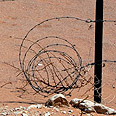
Israel's most unsecured border?
Sinai smugglers face crackdown around Egyptian border but may soon find an alternative route via Jordan, where border area is alarmingly exposed. Residents fear this will be source of next terror attack
Gabi Green, a lifelong farmer, crosses his giant melon field that separates the houses of Kibbutz Lotan and the Jordanian border. Just 50 km (31 miles) north of Eilat, the peace and serenity in kibbutz Lotan is evident. Children playing and splashing in the kibbutz pool can be heard from afar on a hot summer day.
As Green drives across his field, he stops and points at a low barbed-wire fence that could easily be penetrated. Green then points at a small sign posted on the fence and reads: "This is the kingdom of Jordan."
Related stories:
- Report: Israel, Egypt reach understandings on Sinai
- Hamas arrests terrorist behind June border attack Egypt: Sinai terrorists used Hamas tunnels
Next to the official sign, another broken and dusty sign hangs on the fence, declaring that this is the border set during the Israel–Jordan Treaty of Peace in 1994. Over the fence, one can see a Jordanian military outpost in the distance.
This is the "border" that separates Israel from one of the only countries that has yet to endure the consequences of the Arab Spring: Some 260 km (161 miles) of open land with a dilapidated barbed-wire fence. Any one can cross the border, go in, go out, by car or by foot, at daytime or nighttime.
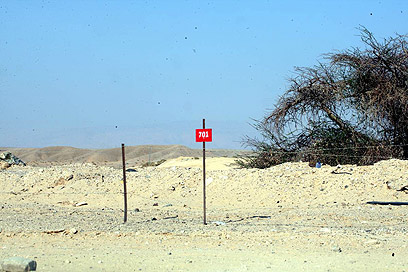
Border fence (Photo: Moti Kimchi)
The State of Israel invests billions of shekels in restoring and building the fence in the more volatile borders. It can even find a way around the budgetary constraints when it comes to building the fence in those areas.
While on the western side of the southern Negev, the efforts to complete building the fence are well underway, Ynet learned this week that on the other side, the situation is not looking so good.
According to the Defense establishment, the border with Jordan – the safest of Israel's borders – is generally divided into two: the Arava sector and the Jordan Valley sector.
The Jordan Valley sector is the more sensitive of the two not only because of its hilly terrain but rather because of the "corridor" which surrounds the Jordan Valley Road that separates Jordan from the West Bank, Palestinian territories and settlements.
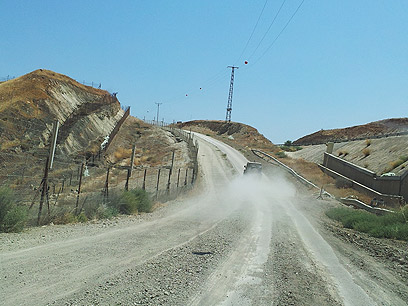
Jordan Valley sector (Photo: Moti Kimchi)
In this sector, which stretches upon 100 km (62 miles), a security fence exists. However, only several parts of it have been significantly upgraded over the past few months. The IDF is preparing to reorganize the radar and observation layout, in effort to increase its control on the area.
In the Arava sector, the fence appears to be even more dilapidated than the fence Israel had on the border with Egypt, prior to building a new one.
During Ynet's investigation in the area, we found that certain sections of the fence that are near to Kibbutzim, are easily penetrable.
Near Kibbutz Lotan for instance, we could in broad daylight stand on Jordanian territory uninterrupted for quite a while. Army patrols in the area are limited due to faulty roads, tall shrubs and generally tough terrain which leave the area more exposed to terror attacks.
This area is part of a new terror smuggling route which may serve terrorists in the near future – from Gaza to south Sinai, from Sinai to Jordan via the sea and from Jordan to Israel. IDF officials fear that as the Egyptian border becomes more secure, Sinai smugglers will start to relocate their efforts and use the Jordan route.
Infiltrators, illegal migrants and terrorists can expect to run into a more prepared and qualified force than the several scattered Egyptian policemen who patrol the western border. The Jordanian soldiers are well prepared and well equipped with weapons from the US.
However, the vast open space and the run down fence can easily be harnessed by potential infiltrators.
"Last weekend, five Turkish infiltrators entered Israel through the Arava sector, and four Pakistanis also attempted to enter the country but were arrested. We haven't seen many African infiltrators but there are signs indicating that it is not too far ahead," the IDF's Jordan Valley Division Commander Nochi Mendel said.
"It is obvious that if Jordan is weakened that we will eventually find Iranians on the fence," he added.
"The Jordanian soldiers keep looking over at Jordan," a reserve soldier on a break from a patrol said. "We don't talk to them. When I was here on active duty it was the same. Once we got here we were told, drive slowly no matter what. There will be no chases."
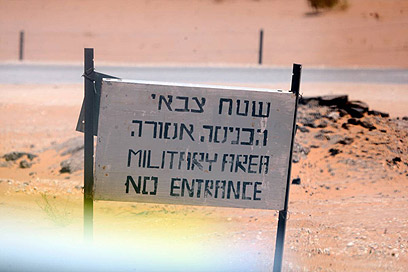
Closed military area (Photo: Moti Kimchi)
Yoni Roth, the IDF security officer for Kibbutz Ketura, which is less than 3 kilometers from the border, has more concerns. Yoni and his friends at the Kibbutz's emergency squad will have just a few short-barrel M-16 rifles at their disposal to use against any terrorists before soldiers arrive at the scene.
"Personally, it really stresses me out because we're a very secluded community," he says. "There are hardly any forces between Eilat and Ein Yahav. It's not reassuring knowing that the army patrol comes by once every few hours when what stands between me and the other side is one sand dune. Once every three weeks when I get a new reserve outfit, the first thing I ask them: 'When there's a real alert, get here fast."
Roth describes a quiet routine where the most dramatic event is migrant infiltrations. "We don't have Gaza to deal with, but based on what's going on around us, I would say the threat is getting nearer."
Asked about his Jordanian neighbors, Roth says that "to the best of my knowledge they are pushing for a fence to be installed and are doing their job well. But I'm not waiting for the day when we'll be forced to learn that things aren't so calm here after all."
Green, the farmer who accompanied us at Kibbutz Lotan is even less optimistic. "Sometimes I work in the fields at night. Who will know if I'm kidnapped? Terrorists can enter the kibbutz easily and access communities west of the Arava Highway within 15 minutes, spray bullets at kindergartens or open fire at the pool. I guess things will only get moving once there is a terrorist attack."
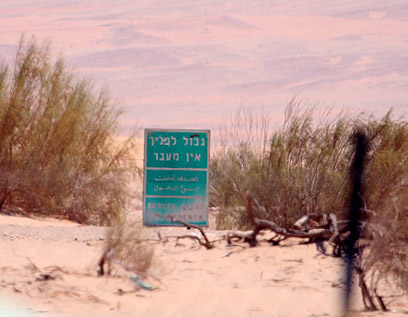
Jordan-Israel border sign (Photo: Moti Kimchi)
The IDF Spokesperson's Unit said in response, "The IDF is constantly monitoring the changes along the borders and working to face the challenges in order to protect Israel and its residents. A year ago the IDF set up the Arava Territorial Brigade which controls the eastern border area, from the Dead Sea to north Eilat. The creation of the brigade is part of a reassessment of the IDF's defense readiness."
Addressing the migrant infiltration problem, the IDF said: "There is ongoing operational activity including foot and vehicle patrols as well as the thwarting of infiltration attempts by forces on the ground."
IDF sources added that "The Jordan peace deal is a strategic asset both for Israel and Jordan and it's in both sides' interest to maintain it."
The prime minister's bureau said that work is being done to promote the construction of a barrier on the eastern border. "There are no infiltrations on the Jordanian border which is secure but the issue of the fence is being handled based on the recognition that shutting the border with Egypt will result in infiltrations through Jordan."
- Receive Ynetnews updates directly to your desktop










